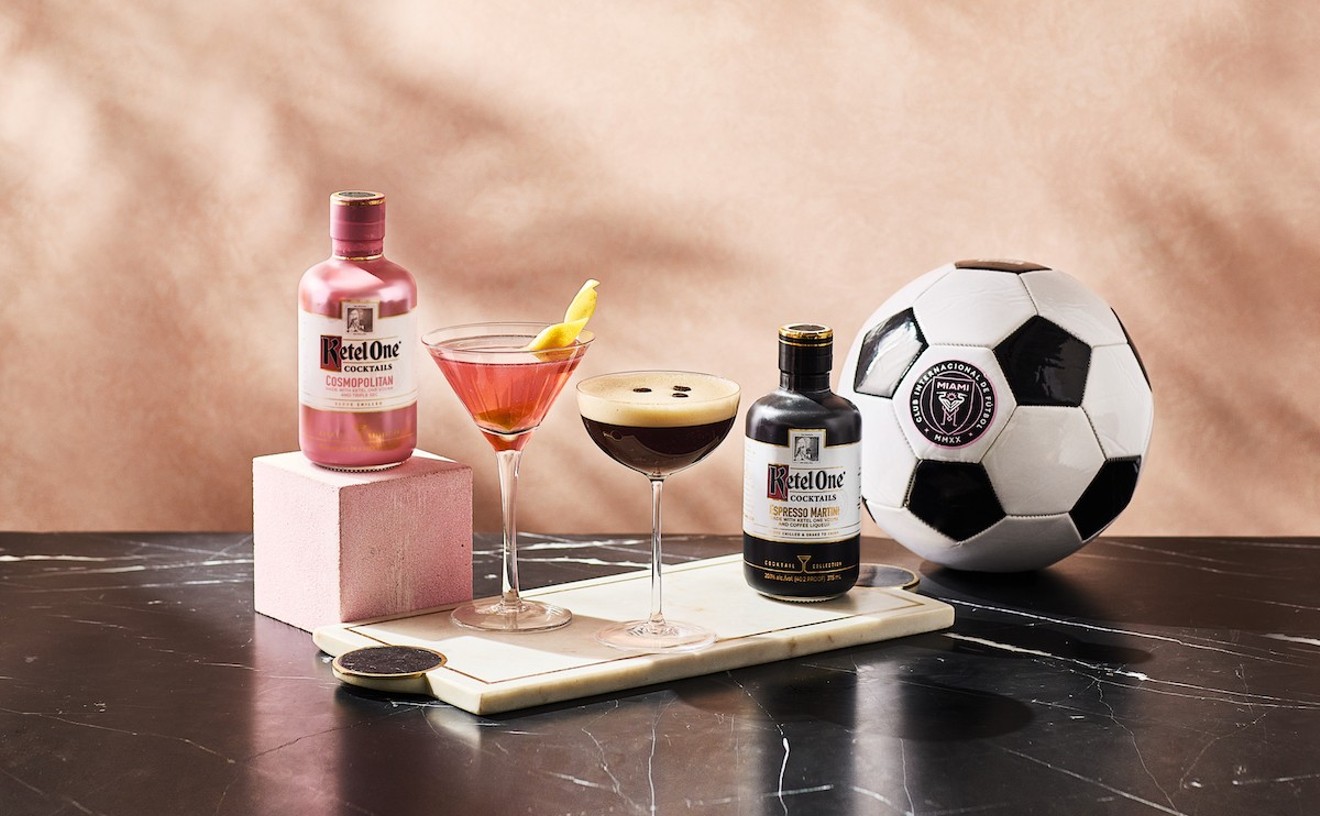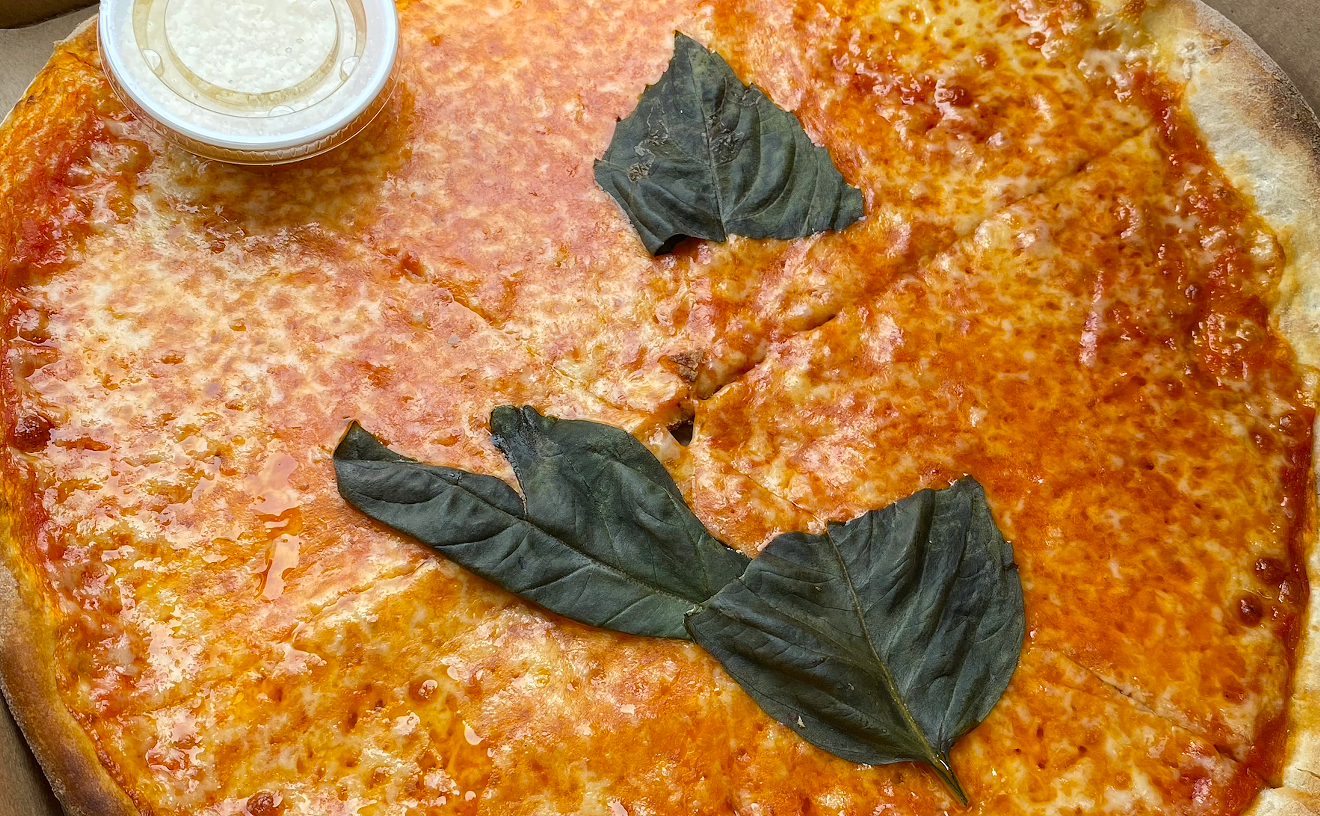We were already stuffed when we started looking at dessert, having just feasted on fluffy pupusas larded with stringy cheese, crispy fried tostones, and pollo à la plancha smothered with a rustic sofrito of tomatoes, onions, and peppers. But after all that food, what my friend and I really longed for was something sweet to put a sugary punctuation mark at the end of our meal. We thumbed over the paper menu and decided that an order of housemade flan would fill that role just fine.
"I'm sorry, but we're out of flan today," said Cristina Ardon, the cheery co-owner of El Guanaco Taqueria y Antojitos, a Salvadoran restaurant in Fort Lauderdale. "But I have something better for you." She darted from our table in the sunny, orange- and cream-colored restaurant and poked her head into a large cooler in the nearby kitchen. "Do you like coconut?" she shouted back.
Eager to see what she'd come up with, my friend and I both nodded. Ardon emerged with two frosty-white tubes covered in a thin layer of plastic. She took a few napkins from the countertop and carefully wrapped them around each tube the way a mother might swaddle an infant.
"These are called charamusca," she said, beaming as she handed the frozen treats to us. Each tube was actually a small plastic bag filled with frozen coconut milk, sweetened sugar, and shreds of chewy coconut. To eat one, Ardon explained, you simply bite off a bit of plastic near the tip and treat it like a Popsicle.
"In El Salvador, people eat these all over, especially when it's hot out," Ardon told us as we sucked on our charamuscas. As mine melted, honey-sweet coconut juice dripped down the sides of the plastic wrapping. But the napkin kept my hands from getting sticky. It reminded me of the Popsicles my parents would make out of concentrated fruit juice when I was a kid — and the race to eat them before they melted in the Florida sun. Store-bought Popsicles, my parents said, were too expensive. I thought the same imaginative spirit was alive in these desserts.
The word charamusca roughly translates in Salvadoran slang to "a mix of things," which is what you'll get at the homey, 8-month-old El Guanaco. The yellow building on Prospect Road caters to the large Salvadoran and Mexican population in that blue-collar stretch of Fort Lauderdale. But according to Ardon, who operates the restaurant with her stepmother and father, El Guanaco serves just as many customers from north of the Rio Grande. As such, the menu is inexpensive and eclectic, with both American- and Salvadoran-style breakfast served all day, daily specials such as mondongo (tripe) soup and stewed oxtail, and a small but tasty selection of antojitos, snacks including tacos constructed on made-to-order corn tortillas and pupusas so satisfying that they could threaten to make El Salvador's national dish the favorite of South Florida.
Those pupusas are what first drew me in to El Guanaco (also Salvadoran slang for, well, the Salvadoran). The dish is essentially two thick corn tortillas that have been stuffed with any combination of cheese, beans, or meat and then closed — sort of like an arepa, only if arepas possessed the kind of intrinsic draw to wake you up from a dead sleep with thoughts of eating one. The nutty masa is griddle-cooked, so the exterior is crisp and pocked with brown marks. Meanwhile, the filling of fresh quesillo cheese melts inside the soft casing, a hot and savory pool that demands to be eaten quickly.
I ordered two pupusas from the small window in the tinted glass counter at El Guanaco — one filled with cheese and a Central American flower bud called loroco ($2.25), the other revueltas-style, which has smooth ground pork called chicharron inside as well as cheese and refried beans ($2.40). At first, I thought the place was to-go only, but Ardon suggested I take a seat. My companion and I chose one of three tables clustered in the center of the small room, just below a television broadcasting telenovelas. We heard the gentle patting sounds of dough being formed by hand coming from the kitchen as we waited.
Within moments, the smiling hostess had brought out a platter of two pupusas sided with a cabbage and carrot slaw called curtido and a glass of cinnamon-laced horchata to wash it down ($2). I couldn't wait to get at the revueltas pupusa: It was steaming hot from the griddle, with the soft, creamy masa yielding to pungent beans and the similarly textured, intensely meaty pork. A little bowl of red tomato sauce on the side is meant to be poured over the curtido and eaten with the pupusa, adding both vegetal crunch and acidic zip. The one with loroco was great as well. The green flower buds are hugely popular in El Salvador; they look and taste sort of like tiny, spiceless green chilies. If you do want a little heat, Ardon will bring you a cup of verdant pepper purée that tastes best when slathered liberally on everything.
The same masa that powers those incredible pupusas is employed to make El Guanaco's stellar tortillas, which show up as tostadas and tacos and alongside just about every other dish the restaurant serves. Unlike typical tortillas, these hand-formed discs are nearly a quarter-inch thick and are made to order. They're so supple, soft, and creamy that you'd be perfectly content to eat them on their own, though they're elevated even further as carne asada tacos ($2.25), tender beef sprinkled with just the right amount of fresh cilantro and raw onion. Spritzed with a bit of lime wedge or some of that hot green salsa, those Salvadoran-style tacos are hard to top.
Except, of course, by the lengua — tongue simmered for hours until supremely tender and intensely beefy. As tough as that part of the animal is to eat for some people, I overheard one reluctant customer praising El Guanaco's version stuffed into a taco. "I thought it would be chewy, but this is so tender and delicious," he said, his mouth full of two kinds of tongue.
Though the restaurant has never been very busy on any of my visits, Ardon is just getting things rolling, having only recently bought into half of the business. She's extremely personable, with a natural affinity for making customers feel welcome — it's why some have even followed her from California Pizza kitchen, where she still works two shifts a week as a bartender and waitress. When I asked if I could order breakfast one afternoon, she smiled and said, "Of course! In my country, people eat breakfast at all times of the day." I was rewarded with a plate of huevos rancheros ($6), complemented with plantains, refried beans, squeaky queso fresco, and powerfully tangy crema. Once I'd used all of my piping-hot tortillas to scoop up bits of tomato and pepper sauce-flecked eggs, Ardon immediately offered to make me some more.
As intensely full as I was, I politely declined. I knew I'd be back again, using those awesome tortillas to sop up sopa de frijoles ($7.50) or sandwich bites of bistec de res with black beans and rice ($9.50). And I've yet to try the freshly fried nachos, big burritos, or sopes topped with chipotle-enhanced chicken breast and crumbled cheese.
Besides, I had to save a little room for dessert. After my rich, afternoon breakfast, a charamusca to go sounded pretty darned good.










